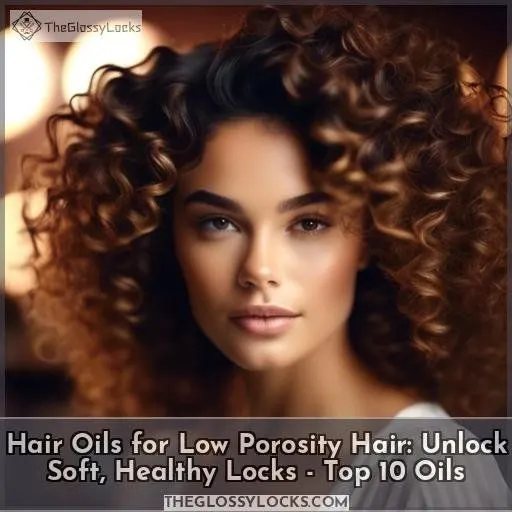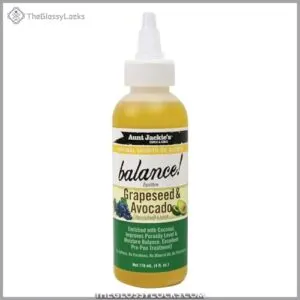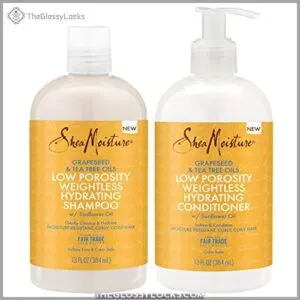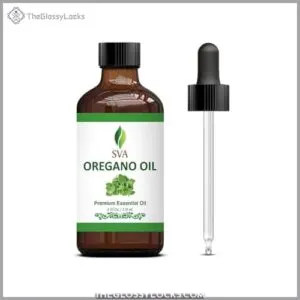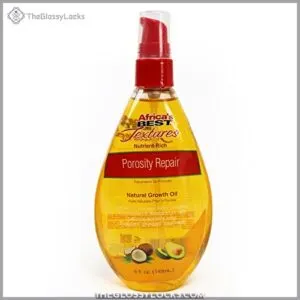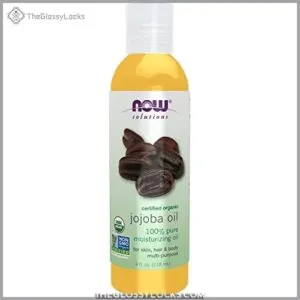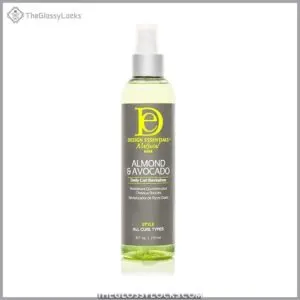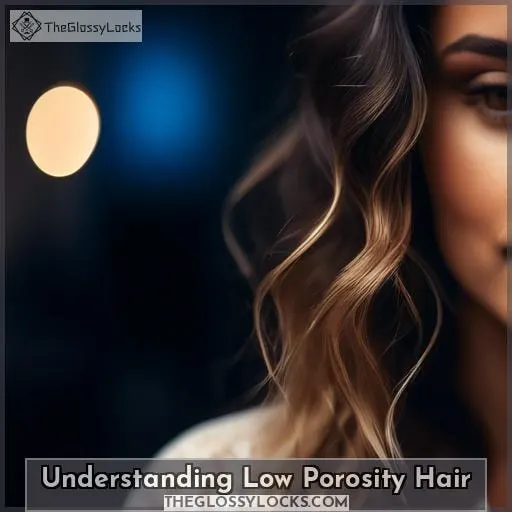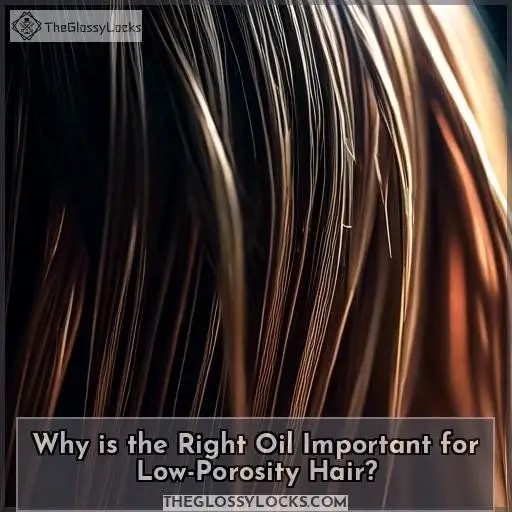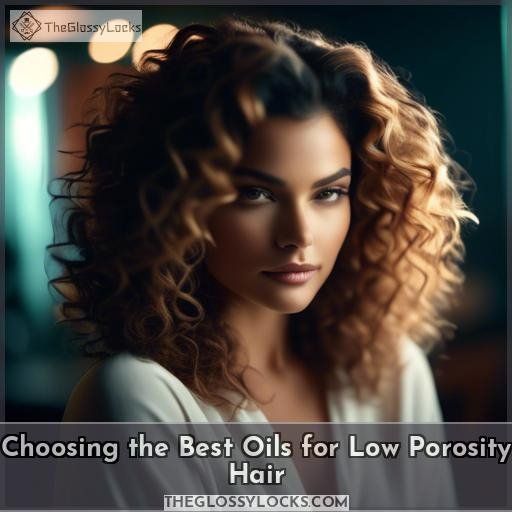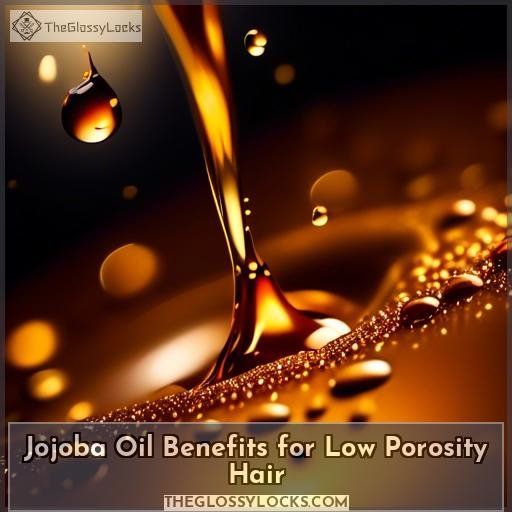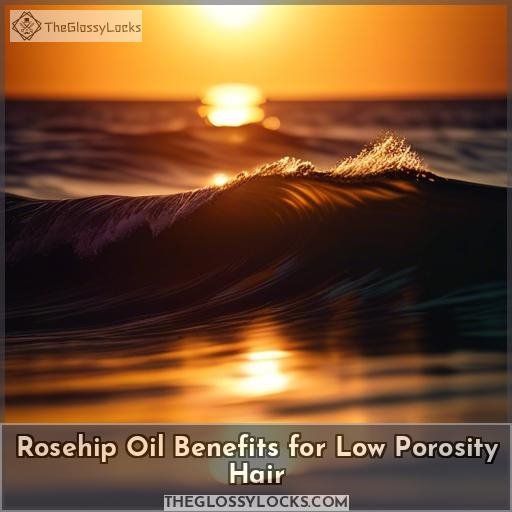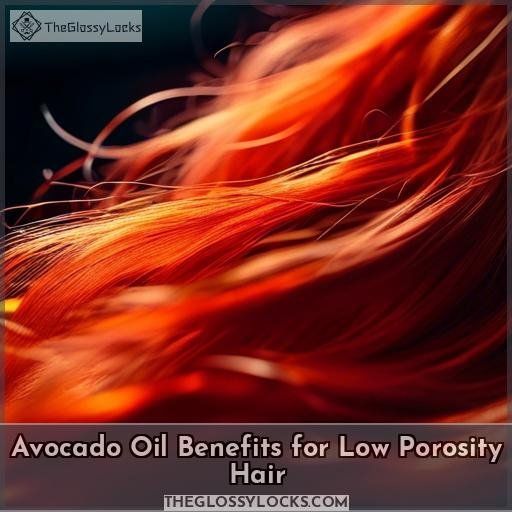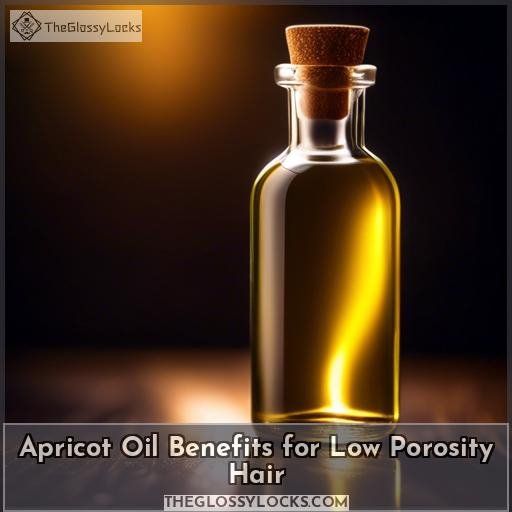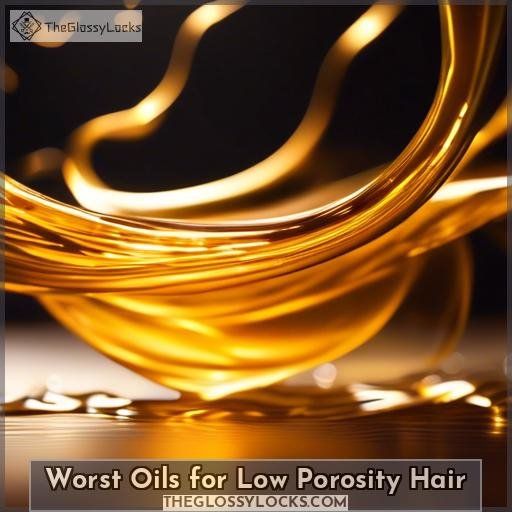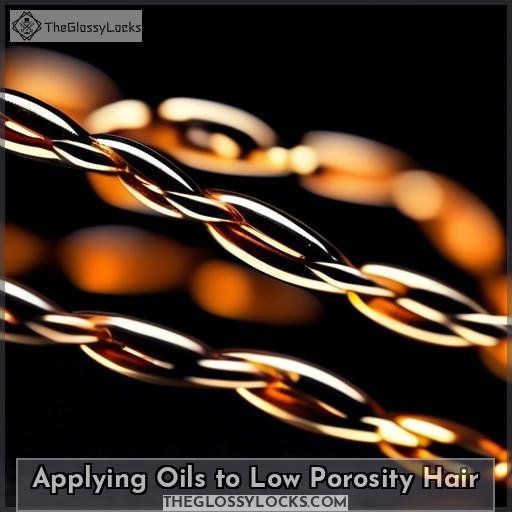This site is supported by our readers. We may earn a commission, at no cost to you, if you purchase through links.
Seek lightweight, deeply penetrating oils for low-porosity hair, such as jojoba, argan, baobab, and sweet almond oil.
These nutrient-rich oils enhance strand health by sealing cuticles, nourishing your scalp for optimal growth, and revitalizing dull locks with essential moisture.
Refrain from dense oils like coconut, olive, castor, and mineral oils, as they may accumulate.
Combining lightweight oils creates a personalized formula designed specifically for the needs of your low-porosity hair.
Unleash the true potential of your hair with the appropriate oil blend – you’ll be astonished by the supple, healthy results.
Table Of Contents
- Key Takeaways
- 10 Best Oils for Low Porosity Hair
- Aunt Jackies Natural Growth Oil Blends
- Shea Moisture Low Porosity Shampoo Conditioner
- Oregano Essential Oil Premium 4 Oz
- Africa’s Best Textures Porosity Repair Growth Oil
- Ogx Argan Oil of Morocco Hair Oil
- Cliganic Organic Jojoba Oil 100% Pure
- Organic Jojoba Moisturizing Multi-Purpose Oil
- Trader Joes Tea Tree Tingle Shampoo
- Eden Bodyworks Hibiscus Honey Curl Shampoo
- Almond Avocado Daily Curl Revitalizer
- Understanding Low-Porosity Hair
- Why is the Right Oil Important for Low-Porosity Hair?
- Choosing the Best Oils for Low Porosity Hair
- Jojoba Oil Benefits for Low Porosity Hair
- Rosehip Oil Benefits for Low Porosity Hair
- Avocado Oil Benefits for Low Porosity Hair
- Apricot Oil Benefits for Low Porosity Hair
- Worst Oils for Low Porosity Hair
- Applying Oils to Low Porosity Hair
- Frequently Asked Questions (FAQs)
- Conclusion
Key Takeaways
- Seek lightweight, deeply penetrating oils like jojoba, argan, baobab, and sweet almond oil for low-porosity hair. Dense oils like coconut, olive, castor, and mineral oils can accumulate and impede moisture absorption.
- Low-porosity hair has tightly bound, overlapping cuticles, resulting in low absorbency, slow drying, and a tendency for product buildup. Nutrient-rich oils can help nourish the scalp, improve strand integrity, and revitalize dull locks.
- Apply oils strategically through pre-poo treatments, deep conditioning with lightweight oils, using the LCO (liquid, cream, oil) method, and massaging the scalp with warm oil and wrapping hair to enhance penetration.
- Jojoba oil is renowned for mimicking natural hair sebum, deeply penetrating low-porosity strands to hydrate without greasiness or buildup. Other lightweight options include rosehip, avocado, and apricot kernel oils.
10 Best Oils for Low Porosity Hair
If you’re struggling with low-porosity hair that seems to reject moisture, you’re not alone – but we’ve got the perfect solution for you.
From Aunt Jackie’s Natural Growth Oil Blends to Shea Moisture’s Low Porosity Shampoo and Conditioner, and even potent oils like Oregano Essential Oil and Africa’s Best Textures Porosity Repair Growth Oil, we’ve curated a list of the top 10 oils that can unlock soft, healthy locks for your low-porosity tresses.
Aunt Jackies Natural Growth Oil Blends
Aunt Jackie’s Natural Growth Oil Blends are a popular choice for those with low porosity hair.
These blends, which include Flaxseed and Monoi oils, are designed to nourish and repair damaged hair, prevent and correct breakage, and improve overall hair health.
They’re suitable for all hair types, including curly, wavy, coily, coarse, and thicker textures.
The blends are fortified with carrier oils that help correct and prevent damage, reduce thinning and shedding, and treat split ends, restoring vibrancy and luster.
They can be used as a pre-poo treatment, as a deep conditioner, or as a moisturizing oil in the LCO (Leave-In, Cream, Oil) method.
Best For:
Aunt Jackie’s Natural Growth Oil Blends are best for individuals with low porosity hair who are seeking to nourish and repair damaged hair, prevent and correct breakage, and improve overall hair health. These blends are suitable for all hair types, including curly, wavy, coily, coarse, and thicker textures.
- Nourishes and Repairs Damaged Hair: The blends are enriched with essential oils and penetrating oils that help combat specific, common hair problems, such as split ends and brittle hair.
- Prevent and Correct Breakage: The carrier oils in the blends help correct and prevent breakage, reducing thinning and shedding.
- Improves Hair Health: These oils are excellent remedies for restoring vibrancy and luster, making hair look and feel healthier.
- Not Suitable for High Porosity Hair: While the blends are suitable for all hair types, they may not be as effective for individuals with high porosity hair, which may require different types of oils or treatments.
- Not a Shampoo or Conditioner: These oils are designed to be used as a pre-poo treatment, deep conditioner, or as a moisturizing oil in the LCO method, not as a shampoo or conditioner.
- May Not Be Sulfate-Free: Some of the ingredients in the blends, such as Ricinus Communis (Castor) Seed Oil, may contain sulfates, which some individuals may prefer to avoid.
Shea Moisture Low Porosity Shampoo Conditioner
Shea Moisture’s Low Porosity Weightless Hydrating Shampoo and Conditioner set is designed specifically for moisture-resistant, low porosity hair types.
These products are formulated with natural ingredients such as sunflower, grapeseed, and tea tree oils, as well as shea butter, which helps to gently cleanse and hydrate the hair without stripping it of its natural oils.
The shampoo is sulfate-free, paraben-free, and cruelty-free, making it a suitable choice for those who prefer natural hair care products.
The conditioner is lightweight and designed to penetrate the hair shaft, providing nourishment and hydration to the hair without leaving residue or buildup.
The set is also vegan and free from silicones, phthalates, mineral oil, and petrolatum.
To use, apply the shampoo to clean, wet hair and work it into a rich lather, then rinse thoroughly. Follow with the conditioner, leaving it on for a few minutes before rinsing.
For best results, use in conjunction with Shea Moisture’s Low Porosity Weightless Hydrating Conditioner.
Best For:
This product is best for individuals with low porosity hair, which is characterized by its resistance to absorbing moisture and its tendency to build up product. The Shea Moisture Low Porosity Shampoo and Conditioner set is specifically designed to address these concerns, providing gentle cleansing and hydration without stripping the hair of its natural oils.
- Formulated with natural ingredients such as sunflower, grapeseed, and tea tree oils, as well as shea butter, which help to hydrate and nourish the hair without weighing it down.
- Sulfate-free and paraben-free, making it a suitable choice for those who prefer natural hair care products.
- Lightweight conditioner that penetrates the hair shaft, providing nourishment and hydration without leaving residue or buildup.
- Cruelty-free and vegan, aligning with ethical and environmental concerns.
- May not work for all hair types, particularly those with high porosity or oily hair.
- Some users have reported a strong scent, which may be a concern for those sensitive to fragrances.
- Some users have reported leakage issues with the shampoo, which could be inconvenient and messy.
Oregano Essential Oil Premium 4 Oz
Oregano Essential Oil Premium 4 Oz is a potent and effective remedy for various hair concerns, including promoting hair growth, addressing scalp issues, and enhancing shine. This oil is abundant in essential nutrients, strong antioxidants, and antimicrobial properties, rendering it a valuable component in your haircare regimen.
To utilize Oregano Essential Oil Premium 4 Oz, dilute it with a carrier oil in a ratio of five drops to one teaspoon. Apply it to your scalp and massage carefully to invigorate your hair follicles and improve overall hair health. Oregano oil can also serve as a hair moisturizer by blending a few drops with a dollop of shampoo or conditioner, or by adding it to a cup of warm water as a rinse before or after shampooing and conditioning.
Bear in mind to conduct a patch test prior to applying the oil to your scalp to ascertain that you don’t experience any adverse reactions. Employ it sparingly and dilute it with a carrier oil to preclude potential scalp irritation. Individual hair types may respond distinctively, so monitor how your hair reacts and adjust your usage correspondingly.
Best For: Individuals seeking a natural solution for hair growth, scalp health, and aromatherapy benefits.
- Contains essential nutrients, strong antioxidants, and antimicrobial properties beneficial for hair and scalp health.
- Versatile in use, can be diluted for hair and scalp massage, nail care, dental care, and used in diffusers for aromatherapy.
- Comes with a dropper for easy application and precise dosage.
- Highly concentrated and may cause burning if used undiluted on the scalp.
- Dropper can be messy, leading to potential wastage or overuse.
- Not considered a good value for the price compared to other brands.
Africa’s Best Textures Porosity Repair Growth Oil
Africa’s Best Textures Porosity Repair Growth Oil is a blend of Vitamin E, Keratin, Aloe, Coconut, and Grapeseed oils designed to help balance the porosity level of your hair.
This oil is perfect for pre-poo treatments, as it’s applied before shampooing to protect and nourish your hair.
The blend of vitamins and natural oils in this product helps to repair and prevent damage, moisturize and condition your hair, and promote healthy hair growth.
It’s suitable for all hair types and textures, making it a versatile choice for those looking to improve the health and appearance of their hair.
To use, simply apply a quarter-size amount to your hair, massage it from roots to tips, comb it through, and leave it on for 10 minutes before rinsing thoroughly.
Best For:
- Best For: All Hair Types and Textures
- Balances hair porosity level
- Promotes healthy hair growth
- Moisturizes and conditions hair
- Reduces frizz
- Can be used as a pre-poo treatment
- Softens hair and skin
- Promotes hair growth
- Good substitute for Blue Magic
- Has a pleasant scent
- Non-oily
- Pricey but worth it
Ogx Argan Oil of Morocco Hair Oil
OGX Argan Oil of Morocco Hair Oil is a nourishing hair oil that can be beneficial for low-porosity hair. Here’s a closer look at its properties and benefits:
OGX Argan Oil of Morocco Hair Oil is formulated with a hydrating blend of rich cold-pressed Moroccan argan oil, which helps revive hair to leave it nourished and silky smooth. This oil is ideal for all hair types and textures and is designed to penetrate the hair shaft, renewing and softening strands while improving strength and elasticity. The sulfate-free surfactant haircare system is paraben-free, making it gentle enough to give locks a radiant shine from the inside out.
The oil has a citrus-fresh, floral-green, and woody scent that leaves locks with an irresistibly good smell. To use the oil, apply a small amount to your palm, rub your hands together, and then apply evenly to the surface of damp (towel-dried) hair, working through to the ends.
For a full hair care routine, you can pair OGX Argan Oil of Morocco Hair Oil with Renewing + Argan Oil of Morocco Shampoo and Conditioner and other OGX Moroccan oil hair products.
Best For:
OGX Argan Oil of Morocco Hair Oil is best for all hair types and textures, including those with low-porosity hair. It is designed to penetrate the hair shaft, renewing and softening strands while improving strength and elasticity.
- Formulated with a hydrating blend of rich cold-pressed Moroccan argan oil, which helps revive hair to leave it nourished and silky smooth.
- Paraben and sulfate-free, making it gentle enough to give locks a radiant shine from the inside out.
- Citrus-fresh, floral-green, and woody scent leaves locks with an irresistibly good smell.
- Ideal for all hair types and textures, including low-porosity hair.
- Some users have reported that the oil can be too heavy for fine hair.
- The scent may be too strong for some users.
- It may not work well for extremely damaged hair.
Cliganic Organic Jojoba Oil 100% Pure
Cliganic Organic Jojoba Oil 100% Pure is an indispensable addition for individuals with low porosity hair.
This feather-light, unrefined oil absorbs swiftly, making it ideal for trapping moisture.
It’s the natural option for those seeking a versatile oil suitable for facial, capillary, and bodily applications.
Furthermore, it bears the USDA organic certification, indicating its non-GMO, vegan, and cruelty-free nature.
Thus, it not only nourishes your hair but also promotes environmental well-being.
It’s a mutually beneficial solution!
Best For:
Cliganic Organic Jojoba Oil 100% Pure is best for individuals with low porosity hair who seek a lightweight, fast-absorbing, and multipurpose oil suitable for facial, hair, and body applications.
- USDA organic certified, ensuring non-GMO, vegan, and cruelty-free nature
- 100% Pure, Single Ingredient Oil with no synthetic additives
- Multipurpose Oil, suitable for face, hair, and body
- Light-weight, unrefined, and fast absorbing
- Non-GMO certified, vegan, and cruelty-free
- Sustainably sourced and minimally processed
- 4 Fl Oz bottle
- Specifically designed for low porosity hair
- May not be suitable for individuals with high porosity hair or other hair types
- Some users may find the scent slightly nutty
- Not suitable for use near flames or high heat
- Keep out of reach of children
Organic Jojoba Moisturizing Multi-Purpose Oil
Organic Jojoba Moisturizing Multi-Purpose Oil is a versatile and beneficial product for both your skin and hair. This oil is derived from the seeds of the jojoba shrub, which is native to southern Arizona and California. It’s cold-pressed, hexane-free, paraben-free, and non-GMO project verified, making it a safe and natural choice for those who prefer organic products.
Jojoba oil is known for its deep penetration and hydrating properties, making it an ideal choice for low porosity hair. It’s lightweight and non-greasy, which means it won’t weigh your hair down or leave a heavy residue. Additionally, it has a long shelf life, which is beneficial for those who prefer to store their oils for extended periods.
To use Organic Jojoba Moisturizing Multi-Purpose Oil on your hair, you can incorporate it into your pre-poo routine by applying it before shampooing. This will help to moisturize your hair and prepare it for cleansing. You can also use it as a deep conditioning treatment by leaving it on your hair for an extended period to allow it to penetrate and nourish your strands.
Best For: Those who prefer organic products and want a versatile oil for both skin and hair care.
- Deep penetration and hydrating properties: Jojoba oil is known for its ability to deeply penetrate and hydrate the skin and hair, making it an ideal choice for low porosity hair.
- Lightweight and non-greasy: This product is lightweight and non-greasy, which means it won’t weigh your hair down or leave a heavy residue.
- Long shelf life: With a long shelf life, you can store this oil for extended periods without worrying about it going bad.
- May not be suitable for high porosity hair: While jojoba oil is beneficial for low porosity hair, it may not be as effective for high porosity hair, which tends to absorb moisture quickly.
- May not be suitable for those with nut allergies: Jojoba oil is derived from the seeds of the jojoba shrub, which is a member of the nut family. Those with nut allergies should exercise caution when using this product.
- May not be suitable for those who prefer scented products: This product has a faint smell of fresh oats, which may not be appealing to those who prefer scented products.
Trader Joes Tea Tree Tingle Shampoo
Trader Joe’s Tea Tree Tingle Shampoo is a popular choice for those with low porosity hair. This shampoo is sulfate-free, which is beneficial for low porosity hair as it helps to maintain the hair’s natural moisture. It contains peppermint, tea tree, and eucalyptus botanicals, which may help alleviate a dry scalp and invigorate the scalp.
The shampoo is suitable for all hair types and is cruelty-free, meaning it hasn’t been tested on animals. It’s also free of laurel/laureth sulfates, which can irritate the scalp and strip hair of natural oils. The shampoo is available in a 16 fl oz (473 mL) bottle, which provides a generous amount of product for a low price point.
Some users have reported that the shampoo leaves their hair feeling clean and soft, and that it has a nice scent. However, it may not be as moisturizing as some other shampoos, especially for those with thick, wavy hair. To address this, users may choose to follow up with a moisturizing conditioner or hair mask.
Best For:
Trader Joe’s Tea Tree Tingle Shampoo is best for individuals with low porosity hair, as it is sulfate-free and helps maintain the hair’s natural moisture. It is also suitable for all hair types and is a popular choice for those with dry scalps.
- Contains peppermint, tea tree, and eucalyptus botanicals that may help alleviate a dry scalp and invigorate the scalp
- Sulfate-free, which is beneficial for low porosity hair and helps maintain the hair’s natural moisture
- Cruelty-free and free of laurel/laureth sulfates, which can irritate the scalp and strip hair of natural oils
- Suitable for all hair types
- Affordable and available in a 16 fl oz (473 mL) bottle
- Some users may not feel a tingle or it may not be as moisturizing as desired, especially for those with thick, wavy hair
- May not last as long as desired, requiring more frequent repurchases
- Some users may experience a waxy knotted texture due to hard water, which can be addressed with an apple cider vinegar rinse
- Not as moisturizing as some other shampoos, especially for those with thick, wavy hair, and may require following up with a moisturizing conditioner or hair mask
Eden Bodyworks Hibiscus Honey Curl Shampoo
Eden Bodyworks Hibiscus Honey Curl Shampoo is a gentle, sulfate-free cleanser designed for all hair textures and colors.
It’s enriched with natural ingredients like hibiscus flower extract, honey, and aloe vera, which add hydration and softness to your hair.
The shampoo is suitable for color-treated hair and is safe to use daily.
To use, apply to wet hair, lather from root to tip, and rinse well.
It’s recommended to shake the bottle before use due to the natural ingredients separating over time.
Best For:
Eden Bodyworks Hibiscus Honey Curl Shampoo is best for individuals with curly hair who are looking for a gentle, sulfate-free cleanser that adds hydration and softness to their hair. This shampoo is also suitable for color-treated hair and can be used daily without stripping the hair’s natural moisture.
- Gently cleanses and nourishes hair: The shampoo effectively removes dirt and buildup without stripping the hair’s natural moisture, leaving it feeling clean and conditioned.
- Adds moisture and softness: The natural ingredients, including hibiscus flower extract, honey, and aloe vera, help to hydrate and soften the hair, giving it an extra boost of hydration.
- Safe to use on color-treated hair: The shampoo is safe to use on color-treated hair, ensuring that the color is not damaged during the cleansing process.
- Natural ingredients may separate: The shampoo contains natural ingredients that may separate over time, so it is recommended to shake the bottle before use.
- May not be suitable for all hair types: While the shampoo is designed for all hair textures and colors, some individuals with straight hair may find it too heavy for their hair type.
- Some users may prefer a stronger fragrance: Although the hibiscus scent is appreciated by many, some users may prefer a stronger fragrance in their shampoo.
Almond Avocado Daily Curl Revitalizer
Almond Avocado Daily Curl Revitalizer is a fantastic choice for those with low porosity hair.
This product is specifically designed to revitalize dry hair, making it an excellent addition to your hair care routine.
It’s suitable for curly, coily, and kinky textured hair, ensuring that it caters to a wide range of hair types.
The almond and avocado oils in this product work together to moisturize and hydrate your hair, giving it a soft, silky feel.
However, be aware that it may cause allergic reactions in some individuals, and it can be sticky.
Additionally, it contains alcohol, which might not be ideal for everyone.
Despite these minor drawbacks, Almond Avocado Daily Curl Revitalizer is a great option for those seeking to enhance their low porosity hair’s health and appearance.
Best For:
Best For: Individuals with low porosity hair, specifically those with curly, coily, and kinky textured hair.
- The product is designed to revitalize dry hair, making it an excellent choice for those with dry hair types.
- It is suitable for a wide range of hair types, including curly, coily, and kinky textured hair.
- The almond and avocado oils in the product work together to moisturize and hydrate the hair, giving it a soft, silky feel.
- It contains wild cherry, which conditions the hair and enhances its silkiness and smoothness.
- The product has a soft hold that helps maintain styles all day.
- It is free from parabens, phthalates, mineral oil, and gluten.
- The product may cause allergic reactions in some individuals.
- It can be sticky, which might not be ideal for everyone.
- It contains alcohol, which might not be suitable for all hair types.
Understanding Low-Porosity Hair
Low-porosity hair has tightly bound, overlapping cuticles that prevent moisture absorption, leading to slow drying time and product buildup. Understanding your hair’s porosity is crucial because it determines how well it can absorb and retain moisture, affecting styling ease and overall hair health.
Low-Porosity Hair Characteristics
Low-porosity hair is characterized by a tightly bound, overlapping cuticle layer. This makes it difficult for hair to absorb moisture and style easily. This hair type is prone to product buildup. It requires a longer saturation time for hair oils to penetrate the hair shaft.
To maintain hair health and moisture retention, it’s essential to choose the right oils for low-porosity hair. These oils should be lightweight and easily absorbed. They should also be rich in nutrients to improve strand integrity, nourish the scalp, and enhance shine.
Some of the best oils for low-porosity hair include jojoba, rosehip, avocado, and apricot kernel oil. By understanding and addressing the unique needs of low-porosity hair, you can achieve soft, healthy locks. You can enjoy the benefits of hair oils for improved hair health and moisture.
Why is Hair Porosity Important?
Porosity awareness is essential for comprehending and caring for low-porosity hair.
This hair type has tightly bound cuticles, which means it struggles with moisture absorption and retention. This can lead to challenges in styling and maintaining healthy hair.
Hair oils play a significant role in addressing these issues. They can help improve strand integrity, nourish the scalp, and infuse life into dull hair.
Customizing your hair care routine with the right oils can make a big difference in managing low-porosity hair. By choosing lightweight, moisturizing oils, you can enhance your hair’s health and appearance.
Why is the Right Oil Important for Low-Porosity Hair?
Selecting the right oils for your low-porosity hair is crucial because oils help improve strand integrity by sealing the hair cuticle, preventing moisture loss and breakage. Furthermore, using the proper oils nourishes your scalp, promoting healthy hair growth, and infuses life into dull strands by imparting shine and vibrancy.
Oils Help Improve Strand Integrity
Just as a knight’s armor protects him in battle, the right oils shield your hair, fortifying each strand from life’s daily jousts. Imagine:
- Jojoba oil, your hair’s hydrating herald.
- Argan oil, the glossy guardian.
- Sweet almond oil, the lightweight champion.
- Baobab oil, the breakage-busting paladin.
These oils aren’t just potions in bottles; they’re your hair’s roundtable of resilience, ensuring hair health remains no mere folklore.
Oils Nourish Your Scalp to Promote Hair Growth
61 words:
The ideal oil is essential for low-porosity hair as it nourishes the scalp, promoting hair growth. Oils like jojoba, rosehip, avocado, and apricot kernel are beneficial, while thicker oils like coconut, olive, castor, and mineral should be avoided. Regular scalp massage, warm oil application, and pre-poo and deep conditioning with lightweight oils can enhance growth and health.
Oils Infuse Life Into Dull Hair
Oils can infuse life into dull, dehydrated hair by providing the necessary moisture and nourishment.
The right oil for low-porosity hair is essential, as oils like mineral oil can create a moisture barrier, while castor oil may weigh hair down and create buildup.
Instead, opt for lightweight oils like jojoba, rosehip, avocado, and apricot kernel oil, which can penetrate the hair shaft and improve strand integrity.
These oils can help revitalize dull hair and prevent premature graying, making them ideal for low-porosity hair.
Choosing the Best Oils for Low Porosity Hair
You’ll want to steer clear of heavy, moisture-blocking oils like coconut, olive, and castor oil when dealing with low-porosity hair. Instead, opt for lightweight, highly-penetrative options that effectively moisturize without causing buildup or weighing your strands down – jojoba, argan, baobab, and sweet almond oil are excellent choices packed with nourishing nutrients.
Avoid Heavier Oils With Low Porosity Hair
Avoiding heavy oils with low porosity hair is essential for maintaining healthy, hydrated locks.
Heavy oils can create buildup, lack penetration, and form a moisture barrier, leading to dry hair.
To maximize hair hydration, consider using lightweight oils for pre-poo treatments, deep conditioning, and the LCO method.
Wrap your hair after applying oils to optimize their benefits.
Choose Low Porosity Hair Oils With Moisturizing Properties
With regards to low-porosity hair, selecting the appropriate oils is paramount.
Choose oils that establish a moisture barrier, aid in scalp nourishment, and enhance the integrity of your strands.
Refrain from utilizing heavy oils that may overburden your hair, leading to buildup.
Instead, prioritize lightweight oils possessing moisturizing qualities.
Illustrative examples include jojoba oil, rosehip oil, and avocado oil.
The optimal oil can profoundly impact the achievement of supple and healthy locks.
Opt for Nutrient-Filled, Low-Porosity Hair Oils
To unleash the true capabilities of your low-porosity hair, it’s essential to embrace oils brimming with nutrients.
Steer clear of dense oils like castor oil that can burden your strands and leave behind a residue.
Instead, opt for oils with a lighter touch and smaller molecular sizes, such as jojoba, rosehip, avocado, or apricot kernel oil.
These oils will nurture your scalp, fortify each strand, and restore life to lackluster hair without inviting buildup or frizz.
The perfect oil can transform your hair care experience.
Jojoba Oil Benefits for Low Porosity Hair
You’ll love jojoba oil for your low-porosity hair because it’s lightweight yet highly penetrative, mimicking your hair’s natural oils to hydrate strands from the inside out.
In contrast, thick, heavy oils like castor oil tend to exacerbate buildup and lie on top of low-porosity hair instead of absorbing.
Opt for lighter, moisturizing alternatives like sweet almond, apricot kernel, or avocado oil.
Jojoba Oil: Lightweight
Low-porosity hair is characterized by tightly bound, overlapping cuticles that make it difficult for moisture to penetrate the hair shaft. This results in low absorbency, slow drying time, product buildup, and longer saturation time. Oils are important for low-porosity hair as they can provide a protective barrier, nourish the scalp, revitalize dull hair, improve strand integrity, and prevent premature graying.
The best oils for low-porosity hair are lightweight and easily absorbed, such as jojoba oil, rosehip oil, avocado oil, and apricot kernel oil. These oils can deeply penetrate the tightly closed cuticles and deliver essential nutrients. In contrast, heavier oils like coconut oil, olive oil, castor oil, and mineral oil can weigh down low-porosity hair and create buildup.
To apply oils effectively, low-porosity hair benefits from pre-poo moisturizing, deep conditioning with lightweight oils, and the LCO (liquid, cream, oil) method for moisture sealing. Techniques like scalp massage, oil warming, and wrapping can also maximize the benefits of oils for low-porosity hair.
Penetrative
Jojoba oil is a lightweight, deeply penetrative oil that’s perfect for low-porosity hair. It closely resembles the natural sebum produced by your scalp, making it easily absorbed by your hair without weighing it down or leaving a greasy residue. Here are three key benefits of using jojoba oil for low-porosity hair:
- Deeply Penetrative: Jojoba oil can penetrate the hair strands deeply, providing nourishment and moisture from the inside out.
- Nourishing: Rich in vitamins and minerals, jojoba oil helps to strengthen hair bulbs, improve scalp health, and enhance the overall condition of your hair.
- Hydrating: Jojoba oil helps to control the level of moisture in your hair, preventing dryness and dehydration, which are common challenges for low-porosity hair.
To get the most out of jojoba oil for your low-porosity hair, consider using it as a pre-poo moisturizer, in deep conditioning treatments, or as part of the LCO (leave-in conditioner, oil, cream) method for sealing in moisture.
Hydrating
Hydrating your low-porosity hair is essential for maintaining its health and appearance. Jojoba oil is the optimal choice for low-porosity hair due to its lightweight, deeply penetrative properties. It resembles the natural hair sebum** and hydrates without greasiness, making it an ideal selection for low-porosity hair.
Jojoba oil has a distinctive composition, making it a versatile oil for various hair types. It assists both dry and oily hair by delivering moisture and retaining it in dry hair, while regulating sebum secretion in oily hair.
To maximize the advantages of jojoba oil, consider blending it with other lightweight oils like argan, macadamia, or coconut oil. This combination will provide comprehensive hair care and a noticeable hair transformation.
Incorporating jojoba oil into your hair care routine can help alleviate itchiness, calm dandruff, and enhance the overall health of your low-porosity hair.
Castor Oil: Thick
Castor oil is a popular choice for hair care due to its antifungal and antibacterial properties. However, it may not be the best option for low porosity hair. Here are three reasons why:
- Weighs hair down: Castor oil is thick and heavy, which can weigh down low porosity hair, making it appear flat and lifeless.
- Blocks out moisture: Its thick consistency can create a barrier that blocks out moisture, leaving your hair dry and brittle.
- Creates product buildup: Castor oil can attract dirt and oil, leading to product buildup on your hair and scalp, which can be difficult to remove.
To avoid these issues, consider using lighter oils that are more suitable for low porosity hair, such as jojoba oil, rosehip oil, avocado oil, or apricot kernel oil.
Heavy
Jojoba oil is a lightweight, deeply penetrative oil that mimics natural hair sebum and hydrates without greasiness. It’s a perfect castor oil substitute for low porosity hair, which can be heavy and create buildup. Choose jojoba oil for its moisture retention benefits and to avoid the challenges of high porosity hair care.
Buildup
Jojoba oil is a fantastic choice for low-porosity hair due to its lightweight, deeply penetrative properties. It closely resembles the natural sebum produced by your scalp, making it easily absorbed by your hair without weighing it down or causing buildup.
Jojoba oil is also rich in vitamins, minerals, and antioxidants. These can help moisturize your hair, soothe your scalp, stimulate hair growth, and protect your hair from damage.
Alternative Oils: Light
If you’re dealing with low-porosity hair, you’ll want to opt for lightweight oil options that can penetrate through your tightly bound cuticles.
Jojoba oil, for instance, is a gold standard for low-porosity hair due to its ability to mimic your natural hair sebum and hydrate without leaving a greasy residue.
Another option is rosehip oil, which has been used for centuries to nourish the scalp and revitalize dull hair.
Avocado oil is also a good choice for its lightweight nature and quick absorption.
Apricot kernel oil is nutritious and quick-absorbing, making it ideal for low-porosity hair.
Moisturizing
Discover the top 10 oils for low porosity hair that bring forth soft, healthy locks.
These oils offer both hydration and tailored benefits for low porosity hair.
Jojoba oil, for instance, is a lightweight, deeply absorbing oil that moisturizes without leaving behind a greasy residue.
Argan oil boasts a wealth of nutrients and forms a protective barrier.
Sweet almond oil is easily absorbed and provides intense hydration.
These oils enhance the integrity of each strand, nourish the scalp, and revitalize dull hair.
Examples
Jojoba oil is a must-have for low-porosity hair due to its lightweight, deeply penetrative nature. It mimics natural hair sebum and hydrates without greasiness. This oil helps improve strand integrity, nourishes the scalp, and revitalizes dull hair. It even prevents premature graying.
Rosehip Oil Benefits for Low Porosity Hair
Rosehip oil offers incredible benefits for low-porosity hair – its lightweight, fast-absorbing molecules easily penetrate the tight cuticles, delivering essential fatty acids and vitamins to nourish the scalp and follicles. It helps revitalize dull, lifeless strands by infusing much-needed moisture and restoring vibrancy, shine, and luster.
Rosehip Oil Absorption
Rosehip oil is a lightweight oil that can penetrate your hair and hydrate it, making it ideal for low porosity hair.
Its nourishing properties can help revitalize dull hair and promote scalp health.
The oil’s high absorption rate is due to its essential fatty acids and vitamins.
These can easily be absorbed by your scalp, nourishing the hair roots from within.
Scalp Nourishment Enhancement
Rosehip oil is your scalp’s soulmate, providing a banquet of nourishment that fosters robust hair growth. Its exceptional absorbency allows your scalp to savor every morsel of goodness, setting the foundation for opulent, lustrous tresses.
- Enhances scalp well-being for unyielding hair growth
- Profound penetration guarantees optimal nourishment
- Leaves hair imbued with a natural, covetable shine
Dull Hair Revitalization
Dull hair can be a vexing issue, but deciphering the underlying causes and implementing appropriate remedies can help transform dull, lifeless strands into vibrant, lustrous locks. Dull hair is distinguished by its lackluster appearance, devoid of radiance or reflection, strands that are arid, coarse, and unruly with frizzy flyaways, and a deficiency of hydration and sheen that’s characteristic of healthy hair.
Common culprits of dull hair include excessive heat styling, adverse weather conditions, overzealous washing, utilizing unsuitable hair products, product accumulation, nutritional imbalances, infrequent brushing, and hormonal fluctuations. To combat these issues, it’s paramount to select the optimal hair oils, as they can assist in enhancing strand integrity, nourishing the scalp, revitalizing dull hair, and preventing premature graying.
For low-porosity hair, which is characterized by tightly bound overlapping cuticles, diminished absorbency, and a propensity for product buildup, it’s imperative to avoid weighty oils that can overburden the hair and hinder moisture penetration. Instead, opt for light, hydrating oils that can permeate the hair shaft and provide sustained benefits. Jojoba oil, rosehip oil, avocado oil, and apricot kernel oil are all superb choices for low-porosity hair.
Avocado Oil Benefits for Low Porosity Hair
Avocado oil’s lightweight, highly absorbent nature makes it a stellar choice for low-porosity hair, readily penetrating the tight cuticles to deeply nourish and moisturize strands. Its rich blend of vitamins, minerals, and fatty acids not only hydrates but also strengthens hair, preventing breakage and promoting healthy growth.
Avocado Oil Benefits
Avocado oil is a lightweight, penetrating oil that’s ideal for low porosity hair. It’s rich in vitamins and minerals, making it a great choice for deep conditioning. Avocado oil is also known for its weightless formula, which means it won’t weigh down your hair. Here are three reasons why avocado oil is a top choice for low porosity hair:
- Deep Conditioning: Avocado oil is easily absorbed, making it perfect for deep conditioning treatments.
- Weightless Penetration: Unlike some heavier oils, avocado oil penetrates your hair without weighing it down.
- Nutrient-Rich: Avocado oil is packed with vitamins and minerals that nourish your hair and scalp.
Low Porosity Hair
Low porosity hair, with its tightly bound cuticles, presents unique challenges in moisture absorption and styling ease.
To maintain its health, it’s essential to choose the right oils.
Opt for lightweight, deeply penetrative oils like jojoba and argan, which mimic natural hair sebum and create a protective coating.
Avoid heavy oils like castor, which can weigh hair down and create buildup.
For best results, pre-poo with moisturizing oils.
Deep condition with lightweight oils.
Seal in moisture with the LCO method.
Hair Oil Choices
When choosing oils for your low-porosity hair, think of avocado oil as your thirsty strands’ best pal.
It’s like a hydration hero, swooping in without the heaviness.
Perfect for DIY blends, its application techniques are a breeze.
Don’t just take a wild guess; do a porosity test to confirm your hair’s thirst level.
Then, let avocado oil quench it with its moisture-rich goodness.
Apricot Oil Benefits for Low Porosity Hair
Apricot kernel oil is a lightweight, nutrient-dense oil that makes it an ideal choice for low-porosity hair. Its quick absorption and moisturizing properties can effectively nourish and revitalize dry, lifeless strands without causing excessive buildup or weighing hair down.
Apricot Oil Benefits
Apricot oil is a fantastic choice for low-porosity hair. It’s lightweight, quick-absorbing, and packed with nutrients. Here are five reasons why apricot oil is a must-have in your hair care routine:
- Nourishment: Apricot oil is rich in vitamins and minerals that help nourish your hair and scalp.
- Quick Absorption: Unlike heavier oils, apricot oil is quickly absorbed, leaving no residue behind.
- Lightweight: It’s perfect for those with low-porosity hair, as it doesn’t weigh down your hair or create buildup.
- Moisturizing: Apricot oil helps lock in moisture, keeping your hair hydrated and healthy.
- Versatile: It can be used in various hair care routines, from pre-poo treatments to deep conditioning.
Low Porosity Hair
Low porosity hair is characterized by tightly bound, overlapping cuticles that make it difficult for moisture to penetrate the hair shaft. This hair type requires specific care and attention to maintain its health and appearance. Here are some key points to understand about low porosity hair:
- Tightly bound cuticles: The cuticles on low porosity hair are tightly bound, which makes it harder for water and products to penetrate the hair shaft.
- Low absorbency: Due to the tightly bound cuticles, low porosity hair has lower absorbency, which means it may not absorb products as easily as other hair types.
- Slow drying time: Low porosity hair tends to take longer to dry, as the tightly bound cuticles slow down the evaporation of water from the hair.
- Product buildup: Low porosity hair is prone to product buildup, especially from protein-filled products, which can weigh down the hair and make it appear dull.
- Longer saturation time: To achieve the desired results, low porosity hair may require longer saturation times with products, such as oils or conditioners, to allow the ingredients to penetrate the hair shaft.
Comprehending the unique characteristics of low porosity hair is essential for selecting the right hair care products and techniques to maintain its health and appearance.
Quick-Absorbing Oils
After delving into the realm of oils for hair with low porosity, let’s focus our attention on a formidable contender: apricot oil.
Its ethereal nature and low resistance make it an instant ally to your strands, providing swift absorption without a protracted wait.
It’s akin to a moisture-preserving guardian, descending to hydrate without any oppressive weight.
For hair that yearns for sustenance but abhors the sensation of being burdened, apricot oil emerges as your indispensable choice.
Worst Oils for Low Porosity Hair
While coconut, olive, castor, and mineral oils are popular hair care choices, you’ll want to avoid using them if you have low-porosity hair. These oils can create buildup, block moisture absorption, weigh your strands down, and hinder your hair’s ability to retain the hydration it desperately needs.
Coconut Oil Isn’t Ideal for Low-Porosity Hair
Coconut oil isn’t typically the best choice for low porosity hair. Its large molecules make it difficult for the oil to penetrate the hair cuticles, leading to buildup and a greasy feel. Instead, opt for lightweight oils that can penetrate the cuticle and provide moisture. Some alternatives include argan oil, grapeseed oil, and sweet almond oil.
Avoid Olive Oil if You Have Low Porosity Hair
Olive oil is not ideal for low porosity hair. It is rich in oleic acid, which can make it heavy and difficult to absorb for hair with tightly sealed cuticles.
Using olive oil on low porosity hair may leave it feeling weighed down and less responsive to styling.
Instead, opt for lighter oils that can penetrate the cuticle and provide moisture, such as argan oil, grapeseed oil, or sweet almond oil.
Castor Oil Isn’t Ideal for Low Porosity Hair
Castor oil may not be the best choice for low porosity hair due to its thick, heavy nature.
It can weigh down hair, block out moisture, create buildup, and attract dirt and oil.
Instead, consider castor oil alternatives like jojoba oil, rosehip oil, avocado oil, or apricot kernel oil.
These oils are lightweight, quickly absorbed, and can improve strand integrity, nourish the scalp, and revitalize dull hair without the negative effects of castor oil.
Avoid Mineral Oil if You Have Low Porosity Hair
Avoid mineral oil if you have low porosity hair. It creates a moisture barrier, which can hinder your hair’s ability to absorb moisture. Instead, opt for oils that moisturize without greasiness, like jojoba oil, which is deeply penetrative and has a low molecular weight. These oils can enhance hair health, prevent premature graying, and improve strand integrity.
Applying Oils to Low Porosity Hair
To maximize the benefits of oils for low-porosity hair, you should incorporate them into your regimen strategically.
As a pre-poo treatment, use a moisturizing oil to saturate strands and promote better absorption during the washing process.
Deep condition with lightweight oils to infuse hydration.
Employ the LCO method (liquid, cream, oil) to seal in moisture.
Massage the scalp with warm oil, wrapping your hair to enhance penetration.
Using Moisturizing Oil as a Pre-Poo
Pre-pooing is a fantastic technique for enhancing moisture penetration in low porosity hair. It involves applying a treatment or conditioner to your hair before shampooing, which can help open the cuticles and allow products to penetrate better. Here’s how you can use moisturizing oil as a pre-poo:
- Choose the Right Oil: Opt for lightweight oils like grapeseed or argan oil, as they can penetrate low porosity hair more easily than heavier oils.
- Apply in Sections: Divide your hair into sections and apply the oil thoroughly, ensuring each section is coated evenly.
- Use Heat: Apply gentle heat using a warm towel or a heat cap to create warmth that allows the product to penetrate better.
- Leave it On: Allow the oil to sit for at least 30 minutes (or as directed on the product) before rinsing thoroughly and following up with your regular shampoo and conditioning routine.
Deep Condition Your Low Porosity Hair With Lightweight Oils
When deep conditioning low porosity hair, lightweight oil options are your secret weapon. Here’s how to elevate your care routine:
- Choose oils like jojoba or argan for their deep conditioning benefits without the weight.
- Warm oils slightly to enhance absorption—think of it as a spa day for your strands.
- Apply methodically, ensuring even distribution for a thorough, revitalizing treatment.
Seal in Moisture With Oil in the LCO Method
Seal in moisture with oil in the LCO method to maximize oil penetration and absorption for low porosity hair. Use a lightweight oil like jojoba or argan oil to avoid product buildup and scalp irritation. Apply oil after cleansing and before styling to enhance moisture retention and promote scalp nourishment.
Massage Your Scalp, Warm the Oil, and Wrap It UP
Essential steps in applying oils to low porosity hair involve massaging your scalp, warming the oil, and securing it. Here’s how to do it:
- Massage your scalp: Gently massage your scalp to stimulate blood flow and enhance oil absorption.
- Warm the oil: Warm the oil in your hands or a warm towel to improve penetration and reduce the risk of buildup.
- Apply to hair: Apply the oil to your hair, focusing on the ends and avoiding the roots to prevent greasiness.
- Secure it: Wrap your hair in a warm towel or plastic cap to retain the oil’s benefits and promote even distribution.
- Repeat as needed: Repeat this process regularly to maintain healthy, hydrated hair.
Frequently Asked Questions (FAQs)
How often should I apply oil to my low-porosity hair?
You should apply oil to your low-porosity hair every 2-3 days, max. Too much oil can lead to buildup and make hair look greasy and limp. Moderation is key – oil just the ends or do a scalp massage, but don’t overdo it.
Can I mix different oils for low-porosity hair?
Yes, absolutely! Mixing oils for low-porosity hair can be a game-changer. Combining lightweight oils like jojoba and argan creates the perfect moisture cocktail that penetrates those stubborn cuticles effortlessly. Experiment and find your holy grail oil blend!
How long should I leave oil in my hair before washing?
With hair as thirsty as the desert, you’ll want to let those oils soak in for a good 30-60 minutes – think of it as a deep-conditioning oasis! This gives the lightweight oils ample time to quench your strands before the rinse.
Are there any side effects of using oils on low-porosity hair?
Yes, there can be side effects if you overdo oils on low-porosity hair. Too much oil can lead to buildup, greasiness, and even clogged pores or scalp irritation. The key? Use light oils sparingly and keep an eye out for any adverse reactions.
Can I use the same oil for both my hair and scalp?
Hair oils can be a versatile elixir, nourishing both your mane and scalp. But like a symphony, choosing complementary oils customized to your hair’s unique needs is key for luscious locks.
Conclusion
Your low-porosity hair‘s journey commences with choosing the ideal lightweight oils.
Comparable to a revitalizing downpour, these oils will quench dry strands, protect cuticles, and support healthy growth.
Befriend jojoba, rosehip, avocado, and apricot oils – your hair’s unwavering companions for unveiling smooth, alluring locks.
Bid farewell to dryness and lackluster; hair oils tailored for low-porosity hair will metamorphose your tresses into a luminous masterpiece.

